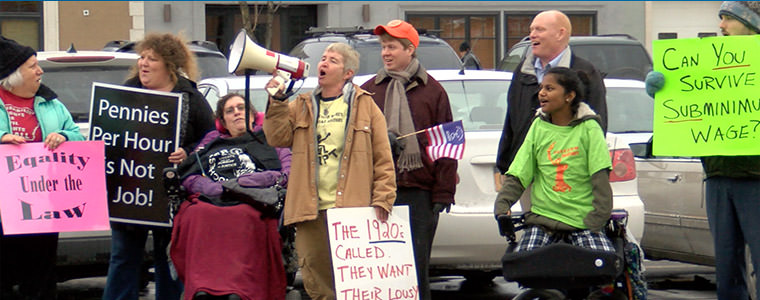
- A
- A
- A
Advocacy Issues
Community Based Services
In order to live active, integrated, productive lives, many people with disabilities require supports and services. For decades in the United States disabled people were not able to get these needed services in their own home and community. Government funded programs, particularly Medicaid, have a bias toward funding institutional services instead of Home and Community-Based Services. CDR is working to end this institutional bias.
In the 1999 Olmstead decision the US Supreme Court affirmed the right of people with disabilities to receive their long term care services in the most integrated setting. Disabled people, old and young, strongly prefer to live in their own home, not in an institution. Furthermore, on average, community-based services are less costly than institutional services. This is because even though in the community the services are provided one-on-one, the services are tailored to be only what the person needs. Instead of paying for unwanted and unused services, Medicaid pays for what the individual really wants and needs. The individual gets to choose to live and receive services while the government pays less for those services. Community-based services are win-win.
CDR has been at the forefront of advocacy struggles in New York and across the US to expand and improve the provision of long term care services in the most integrated setting. Advocating for and monitoring the implementation of such services are core to CDR’s mission of integration, independence and civil rights.
Enforcement of Disability Rights Laws
Many members of the Center for Disability Rights advocated for the passage of the Americans with Disabilities Act (ADA) before CDR was CDR. Even more of CDR’s members and staff have been actively enforcing the ADA ever since. While the ADA has led to improvements in many areas of life for people with disabilities, there is still a great deal of work to be done. CDR continues to work to enforce and expand the ADA and other disability rights laws, including Section 504 of the Rehabilitation Act and the Fair Housing Act. Without active enforcement of these laws, the rights of disabled people will continue to be neglected. CDR will not allow that to happen.
Access to Voting
The right to vote privately and independently for every citizen in the United States is a deeply held value of CDR. For many decades, people with disabilities have been forced to rely on others to cast their ballot for them or been forced to stay home and vote via US Mail. CDR has worked extensively for many years to ensure that people with disabilities are registered to vote and then exercise their right to vote. Where there have been barriers to private, independent voting, CDR has worked to eliminate those barriers. We serve on statewide advisory councils regarding improving the accessibility of New York State’s voting systems and machines.
Communications Access
CDR has played a vital role in the improvement of communication services provided to the Deaf and hard-of-hearing community. Communications Access goes beyond access for individuals with hearing loss. Communications Access also includes ensuring adequate signage in public venues and that the signage includes Braille for individuals who have low or no vision. Communications Access also involves ensuring that people with speech impairments are treated with dignity and respect and given the opportunity to communicate in whatever way works best for each individual.
Promoting Access to Public Transit
Before CDR was even called CDR its members were working to improve access to public transportation. During the 1980s, many disabled people together to advocate for lifts on public buses. CDR continues the battle for people with disabilities to be able to access public transit. Most notably, CDR continues to organize people with disabilities to demand better services from the Rochester-Genesee Regional Transportation Authority. CDR’s transportation advocacy does not stop there. CDR is committed to improving the availability of accessible taxicab services in New York State. CDR also advocates for improvements to access of other forms of transportation, including airlines.
Accessible, Affordable, Integrated Housing
One of the most challenging barriers encountered by people with disabilities is the dire lack of housing that is accessible, affordable, and integrated. This barrier forces many people into institutions. Those who are not forced into institutions to live in unsafe or substandard housing, live in desperation with family members, or pay extremely high rents and suffer financially.
CDR works on national, state, and local levels to develop solutions to this housing crisis. CDR particularly advocates housing options that meet the combined accessibility, affordability and integration needs of people with disabilities. Too often we see housing that meets the needs of individuals in just one of these regards, but this still falls short of an individual’s true goals of independence and integration.
Opposing Physician Assisted Suicide
CDR, along with the overall Disability Community, has long opposed the legalization of assisted suicide. We know firsthand how hard people have to struggle to get decent healthcare. The societal oppression of people with disabilities includes forced institutionalization, impoverishment, and – even now – exclusion from many of the opportunities and experiences other Americans enjoy. Due to the assumption that having a disability is inevitably tied to a poor “quality of life,” all too many medical professionals are prone to seeing people with disabilities as a burden to themselves and to others – as well as an economic burden on medical resources. Assisted suicide is bad public policy. It amounts to the state agreeing that a person’s life is without value. Unless we’re willing to aid and abet the suicides of all people who seriously want to end their lives, granting this “right” to the old, ill, and disabled is only a very lethal form of discrimination.